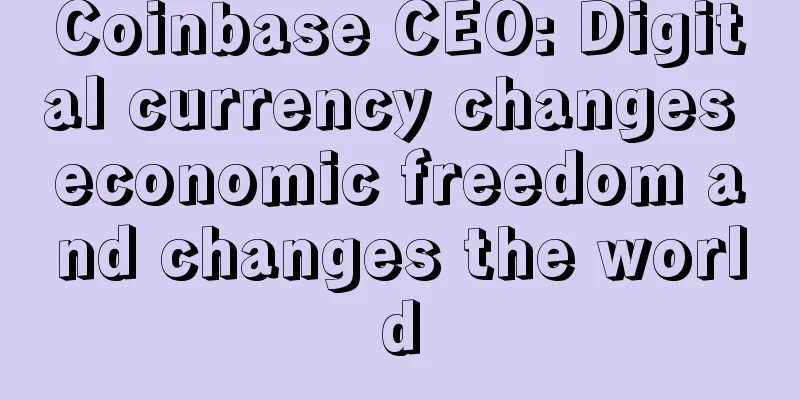Coinbase CEO: Digital currency changes economic freedom and changes the world

|
Digital currency may be the most effective way to increase economic freedom in the world. If digital currency is successful, its impact will be profound. It can lift many countries out of poverty, improve the lives of billions of people, and accelerate the pace of innovation in the world. That’s why I co-founded a digital currency company, Coinbase. I believe it’s the most impactful activity I can do to improve the world right now. In this post, I’ll try to explain what economic freedom is, why it’s important, and how digital currency can change it. What is economic freedom?Economic freedom is a measure of how easy it is for members of a society to participate in the economy. It includes many factors, such as:
There are organizations that score and rank countries around the world based on their economic freedom. The data shown below is published by the Heritage Foundation and the Wall Street Journal. Here is their 2016 list, ranked from best to worst: By looking at the names on both lists, you might begin to realize why financial freedom is important, but here’s another way to look at this ranking. Why is economic freedom important?Economic freedom is correlated with a number of positive outcomes in society. Some might expect, like higher per capita income, life expectancy, and literacy rates. But economic freedom is also associated with things you might not expect, like:
The red bars show countries with low economic freedom, and the green bars show countries with high economic freedom. When I first saw these bars, I was surprised that so many people didn't know about these things. Of course, correlation does not prove causation, so we must be careful not to jump to too many conclusions. Society is very complex, and what works in one place may not work in another. However, this also raises an important question: would we all be better off if the world had more economic freedom? The Impact of Digital Currency on Economic FreedomIn the past, if you wanted to change economic freedom, you had to run for office, lobby a government, or give a speech. If you spent one year in each country trying to change economic freedom, it would take you 196 years to change the world's economic freedom (and you would make different progress in each country). But with the spread and popularity of smartphones, there is now a way to quickly bring digital currency to almost every country in the world. Digital currencies match well with the attributes of economic freedom. 1. Cryptocurrency makes it easier to conduct business Anyone with an idea can acquire customers in mere hours. Digital currencies reduce friction in payments and help companies expand globally. 2. Digital currency has mandatory property rights Many people today do not have a safe way to store their wealth without risk of theft or confiscation. Digital currencies can give everyone control over their own money. In this way, digital currencies will create banks for the unbanked. 3. Digital currency promotes free trade and globalization Cryptocurrency is great for transferring money across borders. It breaks down trade barriers between people in different countries (e.g. getting a loan, or hiring someone to do a job). 4. Digital currency promotes contract freedom Through Ethereum smart contracts, the barrier to participation in the protocol has been lowered for people, regardless of where they live or whether they can afford a lawyer. 5. Cryptocurrencies encourage people to leave low-scoring countries People will find migration easier if they can take their wealth with them and spend it in a neighboring country. Digital currencies make all national economies interoperable, and countries with low switching costs will improve. 6. Digital currency reduces corruption and bribery Conducting business using digital currencies will require fewer managers and intermediaries, with fewer places for people to exert pressure or flatter. 7. Digital currency provides stable currency Currently, cryptocurrencies are more volatile than the dollar or the euro, but their volatility has been decreasing year by year (and is now close to the levels of some fiat currencies). In the next few years, cryptocurrencies will be more stable than 180 of the world's fiat currencies. Today, digital currencies are still in their early stages. But like many technologies, the disruptive consequences could be dramatic. There are many applications of digital currency today (prediction markets, micropayments, smart contracts, remittances, games, etc.), but I think that by 2020, digital currency will be able to disrupt at least one developing country, and digital currency will be used for most transactions in this country. in conclusionOver the past 20 years, the global average of economic freedom has risen by only 3 percentage points (from 57% to 60%). While things are moving in the right direction, they are moving too slowly. With the invention of digital currency, I believe we can greatly increase economic freedom in the world, perhaps as much as 75% in the next 10 years. Economic freedom is one of the great issues of our time (along with AI, quantum computing, and cheap renewable energy). If we could create more economic freedom in the world, it would act as a giant stimulus package for the world economy, speeding up innovation, reducing wars, making life better for the poorest 10%, overthrowing corrupt governments, and increasing happiness. For the first time in history, just a few hundred people can have a significant impact on the world's economic freedom by making new technologies accessible to the masses. If you are interested in this mission, please reach out and help. The original author is Brian Armstrong, co-founder and CEO of Coinbase. |
>>: Global insurance giant MetLife becomes 60th company to join R3 blockchain consortium
Recommend
The face of a scheming person
The face of a scheming person The face is too lon...
Are women with round faces blessed and have happy families?
Physiognomy refers to the features of our facial ...
IMF survey shows that 80% of people consider cryptocurrencies as "money"
Bitcoin was created as the first ever peer-to-pee...
Are men with a zigzag face more likely to encounter bad luck in love?
Encountering bad peach blossoms is not a good thi...
A secure voting solution combining blockchain and paper ballots
Rage Comment : In order to ensure the openness an...
Will a woman with wrinkles between her eyebrows lead to a life of toil?
The area between the eyebrows is what we often ca...
Which women with moles like to flirt with other men?
We all have a few moles on our bodies, but moles ...
Russian Tax Authority: Bitcoin is legal
Russian financial authorities recently officially...
If a person has bad character, you can learn how to judge his character from his face.
Not only can facial features be used to calculate...
Can a woman with a false broken palm on her right hand bring good luck to her husband?
Broken palm is a term in palmistry, which is furt...
Does a man with a narrow forehead have a sinister look? What does it look like for a man with a narrow forehead?
The facial features of different people are also d...
Women with shallow philtrum Women with shallow philtrum and unobvious philtrum
Every woman hopes to have a pair of regular and b...
Eyes tell you which people are more reliable in the workplace
1. People with big eyes are more reliable People ...
Is a triangular face good or bad? A detailed explanation of a triangular face
Physiognomy is a folk knowledge that predicts fat...
Pictures of women with peach blossom face
Pictures of women with peach blossom face Widow&#...









